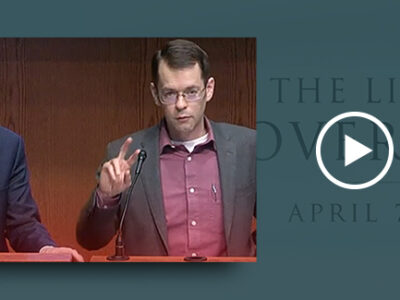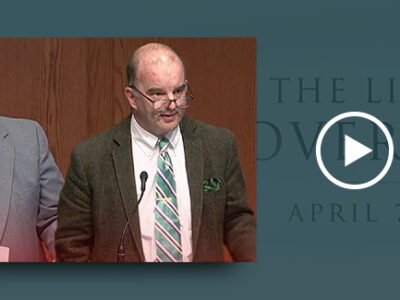Editor’s Note: The “V&V Q&A” is an e-publication from the Center for Vision & Values at Grove City College. Each issue will present an interview with an intriguing thinker or opinion-maker that we hope will prove illuminating to readers everywhere. In this latest edition, Dr. Paul Kengor, the executive director of the Center for Vision & Values, interviews Grove City College President Richard G. Jewell in the next of a series of Q&As with participants in the upcoming April 10-11 conference, “Church & State in 2008,” to be held on the campus of Grove City College.
V&V: President Jewell, our fourth annual conference, “Church & State in 2008,”deals with questions much older than the current political season. We are going back into the past to shed light on this fascinating subject. In so doing, we cannot skip the presidential election of 1960 between Democratic nominee John F. Kennedy and Republican nominee Richard M. Nixon. Before hitting the paramount issue of that election, which was the religion question, let’s back up a bit: First, tell us a little about the Kennedy-Nixon relationship prior to the 1960 race. Did they know one another?
Richard G. Jewell: Dick Nixon and Jack Kennedy, both WWII naval officers with service in the South Pacific, entered Congress in 1946. Kennedy was a war hero, a wealthy bon vivant from Massachusetts; Nixon, more serious and austere, lacking wealth, from California. Although of different parties, they knew each other well and were quite familiar with the early political careers of one another. In 1947 they rode together by train from Washington, DC (and came back that night together in a sleeper) to McKeesport, Pennsylvania (just outside Pittsburgh), in order to debate the Taft-Hartley Labor Act. Nixon was for it, Kennedy was against it. They were both young men greatly on the rise in their respective parties.
V&V: Contrary to the modern perception of the Kennedy family, back in those days John F. Kennedy, Robert F. Kennedy, and their father, Joseph P. Kennedy, were in many ways quite conservative, especially in their anti-communism. RFK worked for Joe McCarthy. Is it also true that the Kennedy men had once crossed party lines and supported Nixon in his earlier Senate run against Helen Gahagan Douglas, an extremely liberal Democrat who was not exactly a solid anti-communist?
Jewell: Using today’s brand (and often misapplied labels), Nixon was conservative and Kennedy considered liberal. However, Kennedy and his family were very anti-communist, and so on a seminal issue of their day they had common ground (with Nixon) against communism. In Nixon’s run for the Senate in 1950 against Helen Gahagan Douglas, a member of Congress from California, both Kennedy and his father contributed to Mr. Nixon’s campaign.
V&V: Who were the principal rivals of JFK and Nixon as they tried to secure their party nominations in 1960? In the case of Kennedy, was his Catholic faith an issue in the Democratic primaries? If so, who raised it?
Jewell: In the run up to 1960, Nixon had some opposition from Nelson Rockefeller, elected governor of New York in 1958. But by convention time he had the nomination in hand. Kennedy was opposed mainly by Sen. Herbert Humphrey of Minnesota, by former Illinois governor and two-time Democratic nominee for president, Adlai Stevenson, and by the Senate majority leader, Lyndon Johnson of Texas. Kennedy chose to contest primaries in order to secure the nomination. His faith was an issue in the Wisconsin primary. Wisconsin should have been a pro-Humphrey state (it bordered Humphrey’s Minnesota and had a strong farm vote—a strength of Humphrey). However, just before the vote, scurrilous anti-Catholic literature was sent to Catholics in the state, which had the effect of cementing a pro-Kennedy coalition and victory. The Humphrey camp denied any responsibility for the hate literature.
V&V: Why were some voters concerned about Kennedy’s Catholicism? What did they fear?
Jewell: It is perhaps hard to believe today, but in 1960, and well before then, there were overt anti-Catholic feelings by many not of that faith. It had been an electoral issue in the presidential election of 1928, and had disqualified the Catholic Democratic senator from Wyoming in 1948 when he was a leading choice to join the Truman ticket as vice president. Supposedly, the fear was that Catholic doctrine and/or papal directives would be followed if they came into conflict with constitutional or secular policy concerns. My favorite quote from the 1960 campaign on this issue came from former President Harry S Truman when he said, “It’s not the Pope I fear but the Pop,” meaning Joseph P. Kennedy, Sr.
V&V: This brings us to the 1960 showdown between the two nominees. Nixon, of course, was not Catholic. I believe he was a Quaker. Did Nixon try to make an issue of Kennedy’s Catholicism? In your estimation, how did Nixon handle this faith question? Was he responsible or irresponsible? Has history been fair to Nixon on this?
Jewell: Nixon carefully instructed his operatives not to make an issue nor comment on Mr. Kennedy’s religion, nor on his father. On occasion a reporter would raise the religion question, and Nixon would answer that it made no difference and was not an issue. So, generally he handled it fairly.
V&V: Are there any lessons or parallels from the 1960 race that might apply in the 2008 race?
Jewell: Yes, as it relates to Senator Obama: For JFK, his religion was distinctive, and for Obama, his race is. However, both were and are highly credible and appealing, besides the respective distinctives of religion and race. Their Senate careers were not known for institutional individual leadership, and both were in the Senate only a short time (Kennedy eight years, Obama three years). Both men—and JFK was a very early example of this—had and have a celebrity status attached to them.
V&V: President Jewell, as you know, this is just the tip of the iceberg. We look forward to hearing more from you in your dinner talk at the conference. Thanks for chatting with us.
Jewell: Thank you




